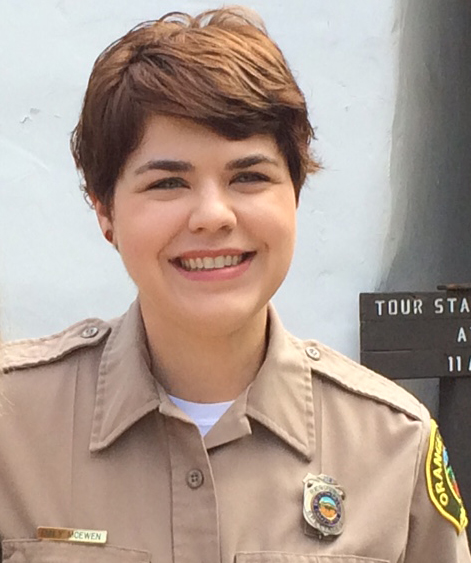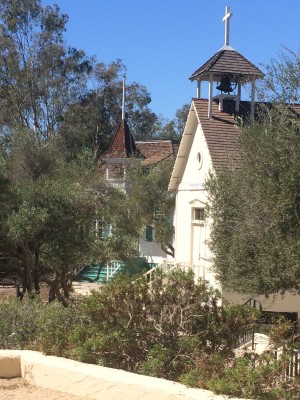Out of the academy and into public service: Changing expectations and new measures of success
04 May 2016 – Emily McEwen

Emily McEwen as resource specialist, April 2015. Photo credit: Emily McEwen
In June 2014, when I finished my PhD in history, with a research emphasis in public history, I thought I was pretty hot stuff. And rightfully so. I had worked for eight long years slogging through coursework, exams, conference presentations, fellowship applications, TAships, a year of research, and a solid year and a half of dissertation writing to achieve my goal. My ultimate goal for earning a doctorate was always to work in the professional public history field. During my graduate studies I had worked as the curator for site listed as a local National Historic Landmark and my CV included a number of museum internships, practica, and small consulting jobs. Two months after graduation I accepted a position as a resource specialist within the historical division of a large county park system.
After only a few days on the job, I quickly realized that I had thought I knew much more about doing public history than I actually did, and just how ill-prepared I was for the rigors of public service. Charged with managing two very busy and very different historic parks, my daily work routine morphed from solitary hours of research and writing to fast-paced days shuttling between the parks, managing two volunteer docent groups, planning large-scale park events, coordinating onsite weddings, and providing customer service to everyone entering the park office. All of a sudden, there was a whole lot of public in my history and I was completely overwhelmed.
While there has been much discussion about the necessity for PhDs to be open to careers outside of academia and how they can successfully market themselves for these jobs, the fact remains that the transition out of the academy and into “the field” can be a rocky one. During my first year as a resource specialist I spent a lot of time beating myself up. As I was trying to get a handle on this new job I had let my own research slide and wasn’t on track to publish an article from my dissertation as I had planned. I crumbled under the expectation (self-imposed mostly) that as a PhD, I should already be spearheading innovative and intellectually stimulating programs within the parks, when in reality I was still trying to figure out the county’s purchase order system and what permits a bride needed to pull in order to serve alcohol at her wedding.
By taking some time to reflect and talking to other recent graduates, I began to see just how difficult the transition out of academia and into the professional public history world can be. As a friend and I mused one day, “We were really good at being graduate students, but now we don’t know what to do.” I had become used to concentrating on my own dissertation project, working relatively independently, and being in an environment where everyone understood the fundamental importance of historical study. When I started with the county park system, I had a hard time adjusting to the fact that my own projects or ideas about what should be done often mattered little because I was now working in the small historical division of a large bureaucracy where I had many layers of bosses and my daily work was focused on serving the needs of the public, whatever those might happen to be.

Historic El Toro Grammar School and St. George’s Episcopal Mission at Heritage Hill Historical Park, October 2015. Photo credit: Emily McEwen
After a solid year-and-a-half on the job I realized that I was judging myself based on my academic understanding of success. By this measure, I felt as if I had failed. I had to realign my thinking to fit the reality of my situation and realize all that I was doing. I was gaining experience in historic park management, a field I had little first-hand knowledge of before beginning as a resource specialist. I was learning valuable supervisory and interpersonal skills in dealing with both volunteers and the park staff. I was gaining a greater understanding of safety protocols for both visitors and staff, something I had never given much thought to. I was slowly understanding the nuances of navigating a large bureaucratic system.
As the staff person in charge of special events, wedding coordination, and the only supervisor on duty on Saturdays, I have acquired a new assertiveness, or what I like to call, general “Taking Care of Business” skills. Did you lose your pet squirrel in the park after it made a break from the vet’s office? Not a problem, I’ll help you look. Did one of your uninvited wedding guests drunkenly punch the security guard? Let me call the sheriff and begin the incident report. Did someone puncture the fuel lines of the entire fleet of park vehicles over the weekend? Once again, let me call the sheriff and begin the incident report. Certainly these are skills that are not–and really cannot–be taught in the classroom, but that I now see the value in possessing. As my graduate advisor told me when I described my new role as wedding coordinator, “If you can handle bridezillas, you can handle anything.” Most importantly, I am finding joy in serving the public, sharing history with the park visitors, working with each park’s dedicated volunteers, and understanding how important these parks are to the community.
A few months into my job I had lunch with a mentor, a retired museum director, who reminded me that it takes time to become proficient at something new, that I needed to step back and get to know each of the sites where I worked before I could even begin to have an understanding of what projects to champion. She also suggested I keep a journal of all the little things that I accomplished each week, all the small victories won, in order to see how those add up, over time, to big improvements. This was exactly what I needed to hear. Even though I held a graduate degree in public history, the daily responsibilities of being a resource specialist were new to me and I needed to take time to learn the job, the history, and the stakeholders at each site I managed before I could embark on any meaningful change. After all, I didn’t start writing my dissertation in my first year of graduate school, but gradually gained the skills and knowledge needed to conquer it. I know that the hard earned skills I honed in eight long years of graduate school– research, critical thinking, writing, project management–will serve me when I do tackle those big projects.
~ Emily McEwen earned her PhD in history from the University of California, Riverside, in 2014. During her graduate studies she worked as a curator and consultant in Riverside, California. For the last year and a half she has worked as a historic resource specialist for a county park system in southern California.




Academic historians teach classes as their “bread and butter.” Public historians don’t carry a class load; they carry the “bread and butter” roles of the varous publics they serve. It would be wonderful if senior academic historians could spend at least one sabbatical under an interagency personnel agreement (IPA) working for government or a business firm that hire historians in order to be able to communicate at least a little about alternative “bread and butter” responsibilities to their students. Hurrah for you, Emily, in figuring all this out for yourself. Public history department faculty: take notice and push for expanding your curriculum to include a course that will help students be prepared for the nonacademic learning curve in public history jobs.
Victoria, what a wonderful idea. I am presenting at the Canadian Historical Association at the end of this month and will bring up your point. I think that Public History professors while excellent in instilling the theory of Public History struggle with its day to day applications (firm deadlines, project budgets, and multiple stakeholders.)
Great post for someone teaching graduate students this very spring about historic site and museum development! For Victoria, a question: How does one arrange an exchange under the IPA? I would love to know more about that.